Landscape Gardening in Shepherds Bush
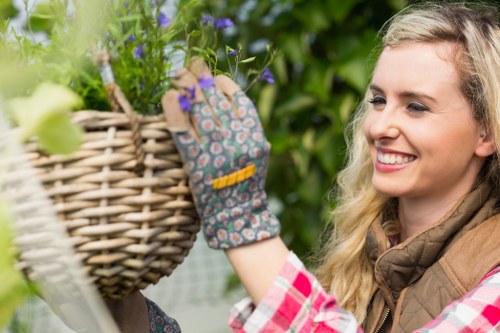
Welcome to the vibrant world of landscape gardening in Shepherds Bush, where urban charm meets lush greenery. Nestled in the heart of West London, Shepherds Bush offers a unique blend of residential tranquility and bustling city life, making it an ideal location for gardening enthusiasts looking to enhance their outdoor spaces.
Whether you're a seasoned gardener or a novice, creating a beautiful landscape garden in Shepherds Bush can transform your property, increase its value, and provide a serene retreat from the everyday hustle. This article delves into the essentials of landscape gardening in this vibrant locale, offering insights and tips to help you cultivate a garden that reflects both your personal style and the character of Shepherds Bush.
From selecting the right plants that thrive in the local climate to incorporating sustainable practices, landscape gardening in Shepherds Bush is both an art and a science. Let's explore how you can design, implement, and maintain a garden that stands out in this eclectic neighborhood.
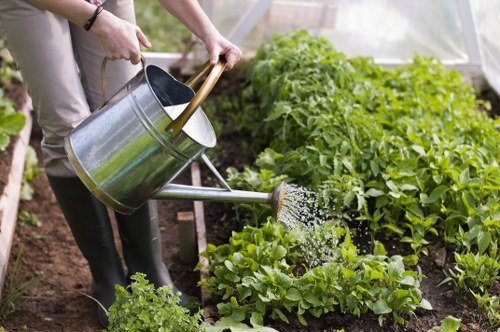
The Benefits of Landscape Gardening in Shepherds Bush
Landscape gardening offers numerous advantages, especially in a vibrant area like Shepherds Bush. One of the primary benefits is the enhancement of curb appeal. A well-designed garden can make your property more attractive, potentially increasing its market value and making it stand out in a competitive real estate market.
Moreover, gardens provide a peaceful sanctuary where you can unwind and connect with nature. Amidst the urban environment of Shepherds Bush, having a lush garden can be a retreat from the noise and rush of city life.
Additionally, landscape gardening contributes to environmental sustainability. By incorporating native plants and implementing eco-friendly practices, you can support local biodiversity, reduce water consumption, and improve air quality in your neighborhood.
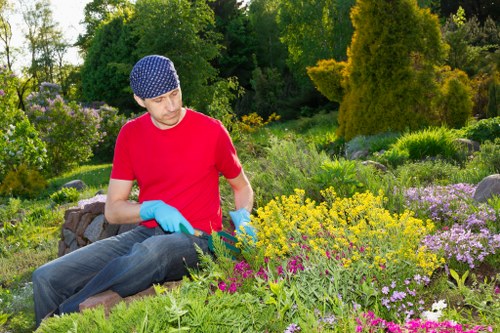
Choosing the Right Plants for Shepherds Bush Gardens
Understanding the Local Climate
Shepherds Bush enjoys a temperate maritime climate, characterized by mild winters and warm summers. When selecting plants for your garden, it's crucial to choose species that can thrive under these conditions. Opting for drought-resistant plants can help minimize water usage and ensure your garden remains vibrant throughout the year.
Consider incorporating a mix of evergreen and deciduous plants to maintain year-round interest. Evergreen shrubs provide structure and greenery even in the colder months, while deciduous plants offer seasonal color and texture.
Native plants are an excellent choice as they are well-adapted to the local environment, require less maintenance, and support local wildlife. Examples include lavender, foxgloves, and British holly, which add both beauty and ecological value to your garden.
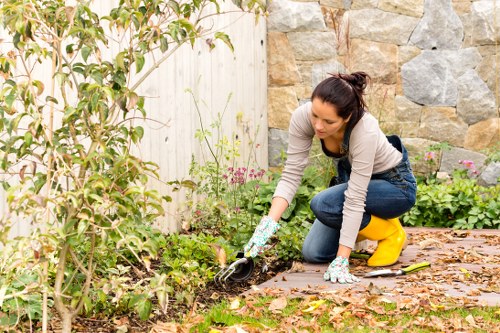
Popular Plant Varieties
When planning your landscape garden in Shepherds Bush, consider a variety of plants to create a dynamic and visually appealing space. Here are some popular choices:
- Roses: Timeless and elegant, roses add a touch of classic beauty.
- Lavender: Not only visually appealing but also fragrant, lavender attracts pollinators.
- Bamboo: Offers a modern look and can serve as a natural privacy screen.
- Hostas: Ideal for shaded areas, hostas add lush foliage.
- Hydrangeas: These provide colorful blooms that can brighten any garden corner.
By selecting a diverse range of plants, you can ensure your garden remains interesting and vibrant throughout the year.
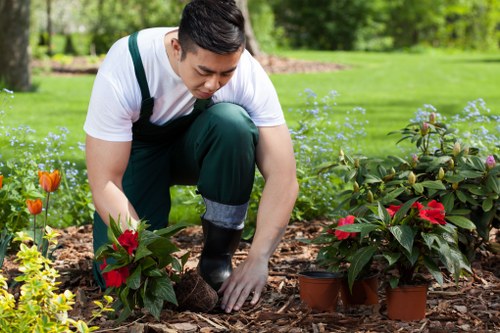
Designing Your Shepherds Bush Garden
Planning and Layout
A successful landscape garden begins with thoughtful planning. Start by assessing the available space, sunlight exposure, and soil quality in your Shepherds Bush property. Creating a layout that maximizes these natural elements will set the foundation for a thriving garden.
Consider the flow of the garden, ensuring there are pathways and seating areas that encourage relaxation and enjoyment. Integrating hardscaping elements like patios, pergolas, and garden benches can enhance the functionality and aesthetic appeal of your outdoor space.
Utilize design principles such as balance, symmetry, and focal points to create a harmonious layout. For instance, placing a striking tree or a water feature at the center can serve as a focal point, drawing attention and adding character to your garden.

Incorporating Sustainable Practices
Sustainability is a key aspect of modern landscape gardening. Implementing eco-friendly practices not only benefits the environment but also ensures the longevity and health of your garden. Here are some strategies to consider:
- Rainwater Harvesting: Collecting rainwater can reduce your reliance on municipal water supplies and provide a natural irrigation source.
- Composting: Recycling garden waste into compost enriches the soil, promoting healthy plant growth.
- Minimal Chemical Use: Opt for organic fertilizers and natural pest control methods to maintain a healthy garden ecosystem.
- Energy-Efficient Lighting: Use solar-powered lights to illuminate pathways and highlight garden features sustainably.
- Native Plant Selection: As mentioned earlier, native plants require less maintenance and support local wildlife.
By prioritizing sustainability, your landscape garden will not only be beautiful but also environmentally responsible.

Professional Landscape Gardening Services in Shepherds Bush
Why Hire a Professional?
While DIY gardening can be rewarding, partnering with professional landscape gardeners in Shepherds Bush offers numerous advantages. Professionals bring expertise, creativity, and resources that can elevate the quality of your garden.
They can help with comprehensive garden planning, ensuring that every element from plant selection to layout is optimized for the best results. Additionally, professionals have access to specialized tools and materials, making the implementation process more efficient and effective.
Moreover, hiring experts ensures that your garden adheres to local regulations and sustainability standards, providing peace of mind and a hassle-free experience.

Choosing the Right Landscaping Company
When selecting a landscape gardening service in Shepherds Bush, consider the following factors:
- Experience: Look for companies with a proven track record and extensive experience in landscape gardening.
- Portfolio: Review their past projects to gauge their design style and quality of work.
- Customer Reviews: Testimonials and reviews can provide insights into their reliability and customer satisfaction.
- Services Offered: Ensure the company offers the specific services you need, such as design, installation, and maintenance.
- Cost: Obtain detailed quotes and compare prices to find a service that fits your budget.
Taking the time to research and choose the right landscaping company can significantly impact the success of your garden project.

Maintaining Your Landscape Garden
Regular Care and Upkeep
Once your landscape garden is established, maintaining it is crucial to ensure its continued beauty and health. Regular care involves several tasks, including:
- Watering: Proper irrigation is essential, especially during dry spells. Consider installing a drip irrigation system for efficient water usage.
- Pruning: Regular pruning helps shape plants, promote growth, and prevent diseases.
- Weeding: Keeping weeds at bay maintains the aesthetic appeal and prevents competition for nutrients.
- Fertilizing: Providing appropriate nutrients supports robust plant growth and vibrant blooms.
- Pest Control: Monitoring for pests and addressing issues promptly ensures a healthy garden ecosystem.
Establishing a maintenance schedule or hiring a professional service can help keep your garden in optimal condition year-round.

Seasonal Gardening Tips
Adapting your gardening practices to the changing seasons can enhance the resilience and beauty of your landscape garden. Here are some seasonal tips for Shepherds Bush:
- Spring: Begin by clearing debris and preparing the soil. Plant spring-blooming flowers and start new vegetable beds.
- Summer: Focus on regular watering, pest control, and deadheading spent blooms to encourage continuous flowering.
- Autumn: Plant autumn perennials, rake fallen leaves, and prepare plants for winter by mulching.
- Winter: Protect sensitive plants from frost, prune dormant trees and shrubs, and plan your garden layout for the coming year.
Implementing these seasonal practices ensures that your landscape garden remains healthy and picturesque throughout the year.

Incorporating Hardscaping Elements
Enhancing Functionality and Aesthetics
Hardscaping refers to the non-living elements of your garden, such as pathways, patios, and retaining walls. Integrating these features can significantly enhance both the functionality and visual appeal of your landscape garden in Shepherds Bush.
Pathways guide visitors through your garden, creating a sense of journey and discovery. Materials like gravel, stone, or pavers can add texture and style to your outdoor space.
Patios and Decks provide spaces for outdoor entertainment and relaxation. Designing comfortable seating areas with shade options like pergolas or umbrellas can make your garden more inviting.

Water Features and Lighting
Incorporating water features such as fountains, ponds, or waterfalls can add a soothing element to your garden. The sound of flowing water enhances the ambiance and attracts wildlife, creating a tranquil environment.
Outdoor lighting plays a crucial role in extending the usability of your garden into the evening hours. Strategically placed lights can highlight key features, ensure safety along pathways, and create a magical atmosphere after dark.
Consider energy-efficient options like LED lighting or solar-powered fixtures to maintain sustainability while enjoying the benefits of illumination.

Creating Sustainable Gardens
Eco-Friendly Practices
Sustainability is at the forefront of modern landscape gardening. By adopting eco-friendly practices, you contribute to environmental conservation and create a garden that thrives with minimal impact on the planet.
Here are some sustainable gardening practices to consider in Shepherds Bush:
- Composting: Turn organic waste into nutrient-rich compost to enhance soil fertility naturally.
- Rainwater Harvesting: Collect and store rainwater for irrigation, reducing dependence on tap water.
- Mulching: Apply mulch to retain soil moisture, suppress weeds, and regulate soil temperature.
- Native Plant Selection: Use native species that require less water and are more resistant to local pests and diseases.
- Organic Pest Control: Implement natural pest deterrents to maintain a balanced ecosystem without harmful chemicals.
Embracing these practices not only benefits the environment but also ensures a healthier and more resilient garden.

Green Certifications and Standards
Adhering to green certifications and standards can further solidify your commitment to sustainability. Certifications like the Royal Horticultural Society's Sustainable Gardening Standard provide guidelines and recognition for environmentally responsible gardening practices.
Incorporating these standards into your landscape gardening efforts in Shepherds Bush can differentiate your garden, showcasing it as a model of sustainability and ecological harmony.
Consult with professional landscape gardeners who are knowledgeable about these standards to ensure your garden meets or exceeds sustainability benchmarks.

Maximizing Small Garden Spaces
Creative Design Solutions
Not everyone has the luxury of a sprawling garden, especially in urban areas like Shepherds Bush. However, with creative design solutions, even small garden spaces can be transformed into beautiful and functional outdoor retreats.
Here are some tips for maximizing small garden areas:
- Vertical Gardening: Utilize walls, fences, and trellises to grow plants vertically, saving ground space and adding visual interest.
- Compact Plant Varieties: Choose plants that are well-suited for small spaces, such as dwarf shrubs and container-friendly flowers.
- Multi-Functional Features: Incorporate elements like foldable furniture or storage benches to optimize space usage.
- Mirrors and Reflective Surfaces: Use mirrors to create the illusion of a larger space and enhance light distribution.
- Layered Planting: Arrange plants in layers, with taller species at the back and shorter ones in front, to maximize depth and coverage.
By implementing these strategies, you can create a vibrant and inviting small garden that maximizes every inch of available space.

Smart Storage Solutions
Efficient storage is essential for maintaining a tidy and organized small garden. Incorporate storage solutions that blend seamlessly with your landscape design, such as:
- Built-In Shelving: Install shelves within garden structures or along walls to store tools and supplies neatly.
- Garden Sheds: Opt for compact sheds that provide ample storage without dominating the space.
- Multi-Functional Furniture: Use benches and tables with hidden storage compartments to keep essentials out of sight.
- Hanging Storage: Utilize hooks and hanging baskets to store lightweight items without taking up ground space.
- Integrated Planters: Combine storage with planting areas by using planters that double as storage units.
These solutions help maintain a clutter-free environment, ensuring your small garden remains a pleasant and inviting space.

Enhancing Privacy in Urban Gardens
Natural and Structural Barriers
In bustling areas like Shepherds Bush, creating a sense of privacy in your garden is essential for a peaceful retreat. Achieving privacy can be accomplished through both natural and structural barriers.
Natural Barriers: Planting tall hedges, trees, or climbing vines can provide a natural screen from neighbors and passersby. Species like bamboo or privacy shrubs grow quickly and form dense barriers, ensuring seclusion.
Structural Barriers: Installing fences, walls, or pergolas can offer immediate privacy while also serving as design elements. Materials such as wood, metal, or composite panels can complement your garden's aesthetic while providing the necessary seclusion.

Soundproofing Techniques
In addition to visual privacy, minimizing noise intrusion can enhance the tranquility of your landscape garden. Here are some soundproofing techniques to consider:
- Water Features: The gentle sound of flowing water can mask background noise, creating a calming atmosphere.
- Dense Planting: Strategically placed plants and shrubs can absorb sound, reducing noise levels.
- Sound Barriers: Utilize fences or walls with sound-absorbing materials to block unwanted noise.
- Pathway Design: Incorporate soft materials like gravel or mulch in pathways to minimize noise from foot traffic.
- Outdoor Curtains: Use weather-resistant curtains around seating areas to dampen sound and add a layer of privacy.
Implementing these techniques can significantly improve the acoustic environment of your garden, making it a more serene and enjoyable space.

Integrating Technology into Landscape Gardening
Smart Irrigation Systems
Technology has revolutionized landscape gardening, offering tools and systems that enhance efficiency and ease of maintenance. One such innovation is the smart irrigation system.
Smart irrigation systems use sensors and weather data to optimize watering schedules, ensuring plants receive the right amount of water without wastage. These systems can be controlled remotely via smartphone apps, allowing you to manage your garden's irrigation needs effortlessly.
In Shepherds Bush, where water conservation is important, smart irrigation systems can help maintain a healthy garden while adhering to sustainable practices.

Automated Lighting and Security
Enhancing your landscape garden with automated lighting not only adds aesthetic value but also improves security. Automated lighting systems can be programmed to turn on and off at specific times or be motion-activated, providing illumination when needed without manual intervention.
Integrating security features like cameras and motion sensors into your garden's layout can offer peace of mind, ensuring your outdoor space is protected while you're away.
These technological enhancements make managing your landscape garden more convenient and secure, aligning with modern lifestyle needs.

Seasonal Color Schemes
Choosing the Right Palette
Incorporating seasonal color schemes into your landscape garden can keep it vibrant and engaging throughout the year. Selecting the right palette involves choosing colors that complement each other and reflect the changing seasons.
For **spring**, opt for pastel hues and bright flowers like tulips and daffodils. In **summer**, bold colors from roses, sunflowers, and marigolds can create a lively atmosphere.
**Autumn** calls for warm tones such as oranges, reds, and yellows from chrysanthemums and dahlias, while **winter** can incorporate evergreens and plants with frosted foliage to maintain color and texture.

Planting for Year-Round Interest
To ensure your garden remains appealing all year, select plants that offer seasonal interest. Combining different types of plants that bloom at various times ensures continuous color and activity in your landscape garden.
Consider layering plants with different blooming periods and foliage variations. This approach not only adds depth to your garden but also attracts a variety of pollinators and wildlife, enhancing the ecological diversity of your space.
Additionally, incorporating ornamental grasses and shrubs with colorful bark can provide visual interest even when other plants are dormant.

Outdoor Living Spaces
Creating Functional Areas
Expanding your landscape garden to include outdoor living spaces can enhance the usability and enjoyment of your garden. Designing areas for dining, lounging, or entertaining can make your garden a central hub for social gatherings and relaxation.
Here are some ideas to consider:
- Patio Areas: Set up outdoor furniture and dining sets to create a space for meals and gatherings.
- Fire Pits: Adding a fire pit provides warmth and a focal point for evening activities.
- Outdoor Kitchens: For those who love to cook al fresco, an outdoor kitchen can be a valuable addition.
- Seating Nooks: Incorporate cozy seating areas with cushions and umbrellas for comfortable relaxation.
- Gazebos and Pergolas: These structures offer shade and shelter, making your outdoor spaces more versatile.
By thoughtfully integrating these elements, you can create multifunctional areas that enhance both the aesthetics and functionality of your landscape garden.

Choosing the Right Furniture and Accessories
Selecting appropriate outdoor furniture and accessories is essential for creating comfortable and inviting outdoor living spaces. Here are some tips:
- Material Selection: Choose durable materials like teak, wrought iron, or weather-resistant wicker that can withstand the elements.
- Comfort: Invest in comfortable seating with cushions and ergonomic designs to encourage relaxation.
- Style: Select furniture that complements your garden's design theme, whether it's modern, rustic, or traditional.
- Accessories: Add elements like outdoor rugs, lanterns, and decorative pillows to enhance the space's ambiance.
- Storage: Incorporate storage solutions like benches with hidden compartments to keep cushions and accessories organized.
Well-chosen furniture and accessories can transform your outdoor living spaces into elegant and comfortable extensions of your home.

Lighting Design in Landscape Gardens
Types of Outdoor Lighting
Proper lighting is crucial for highlighting your landscape garden's features and extending its usability into the night. Different types of outdoor lighting can serve various purposes:
- Path Lighting: Illuminates walkways and pathways, ensuring safety and guiding visitors through your garden.
- Accent Lighting: Highlights specific garden features like sculptures, water features, or unique plants.
- Ambient Lighting: Creates a soft, overall illumination that enhances the garden's mood and atmosphere.
- Task Lighting: Provides focused light for specific activities, such as reading or cooking outdoors.
- Security Lighting: Enhances the safety of your property by deterring intruders and illuminating dark areas.
Integrating a mix of these lighting types can create a balanced and inviting atmosphere in your landscape garden.

Energy-Efficient Lighting Solutions
Adopting energy-efficient lighting solutions not only reduces your environmental footprint but also lowers energy costs. Here are some options to consider:
- LED Lights: Long-lasting and energy-efficient, LED lights are available in various colors and styles to suit your garden's needs.
- Solar-Powered Fixtures: Harnessing solar energy, these lights are eco-friendly and easy to install without the need for wiring.
- Motion-Activated Lights: These lights turn on only when motion is detected, providing security and conserving energy.
- Low-Voltage Systems: Safe and efficient, low-voltage lighting systems offer flexibility in design and installation.
- Smart Lighting: Integrate lighting systems with smart home technology for remote control and automation.
Choosing energy-efficient lighting options ensures your landscape garden is both beautiful and sustainable.

Gardening Tools and Equipment
Essential Tools for Landscape Gardening
Having the right tools and equipment is vital for effective landscape gardening. Whether you're a DIY enthusiast or working with professionals, these essential tools can make gardening tasks easier and more efficient:
- Hand Trowel: Perfect for planting, weeding, and small-scale digging.
- Pruning Shears: Essential for trimming and shaping plants.
- Loppers: Ideal for cutting thicker branches and maintaining larger shrubs.
- Garden Fork: Useful for aerating soil and breaking up compacted earth.
- Wheelbarrow: Facilitates the transport of soil, plants, and tools around your garden.
- Rake: Helps in leveling soil, gathering leaves, and spreading mulch.
- Gloves: Protect your hands from thorns, dirt, and potential injuries while gardening.
- Watering Can or Hose: Ensures your plants receive adequate water.
- Gardening Knife: Useful for a variety of cutting tasks, including dividing plants and harvesting.
- Measuring Tape: Essential for planning garden layouts and ensuring proper spacing.
Investing in quality gardening tools enhances your efficiency and the overall success of your landscape gardening endeavors in Shepherds Bush.

Advanced Gardening Equipment
For larger landscape gardening projects, advanced equipment can significantly improve productivity and results. Consider incorporating the following:
- Power Tillers: Facilitate the preparation of large garden beds by breaking up soil quickly and efficiently.
- Rototillers: Ideal for deep soil cultivation, promoting better root growth for plants.
- Lawn Mowers: Essential for maintaining grassy areas, ensuring a neat and tidy appearance.
- Leaf Blowers: Help in rapidly clearing leaves and debris from hard-to-reach areas.
- Chainsaws: Useful for trimming and removing larger branches from trees and shrubs.
- Garden Tractors: Multi-purpose machines that can handle a variety of tasks, from mowing to hauling.
- Sprayers: Facilitate the application of fertilizers, pesticides, and herbicides evenly across your garden.
Using advanced equipment can streamline your gardening processes, making large-scale landscape projects more manageable and efficient.

Garden Accessories and Decor
Adding Personality to Your Garden
Incorporating accessories and decor into your landscape garden can add personality and enhance its overall aesthetic. These elements reflect your personal style and create visual interest throughout the garden.
Here are some ideas to consider:
- Garden Sculptures: Artistic sculptures and statues can serve as focal points and add a touch of elegance or whimsy.
- Decorative Pots and Planters: Stylish containers can showcase your favorite plants and add color and texture to your garden.
- Bird Feeders and Houses: Attracting birds adds life and movement to your garden while supporting local wildlife.
- Wind Chimes: These not only add auditory charm but also enhance the sensory experience of your garden.
- Garden Art: Incorporate murals, mosaic pathways, or painted rocks to infuse creativity into your outdoor space.
Thoughtfully selected accessories and decor can transform your landscape garden into a personalized oasis that showcases your unique taste and creativity.

Functional Decor Elements
Beyond aesthetics, some garden accessories serve functional purposes, enhancing the utility of your landscape garden:
- Outdoor Lighting Fixtures: As previously discussed, lighting not only illuminates your garden but also adds decorative value.
- Water Features: Fountains and ponds provide both visual appeal and a soothing auditory backdrop.
- Seating Solutions: Benches, swings, and hammocks offer comfortable places to relax and enjoy your garden.
- Storage Units: Attractive storage boxes or sheds can keep gardening tools organized and out of sight.
- Gazebos and Pergolas: These structures provide shelter and a defined space for outdoor activities.
Integrating functional decor elements ensures that your garden is not only beautiful but also practical and comfortable.

Conclusion
Embarking on a landscape gardening journey in Shepherds Bush offers endless possibilities to create a personalized and enchanting outdoor space. By carefully selecting the right plants, incorporating sustainable practices, and integrating functional and decorative elements, you can transform your garden into a sanctuary that reflects your style and enhances your property's appeal.
Whether you choose to work with professional landscape gardeners or embark on a DIY project, the key is thoughtful planning and consistent maintenance. Embrace the vibrant spirit of Shepherds Bush and cultivate a garden that thrives amidst the urban landscape.
Ready to transform your garden? Contact us today to start your landscape gardening project in Shepherds Bush and create the outdoor space of your dreams.